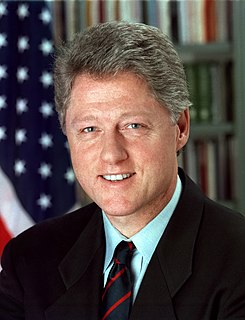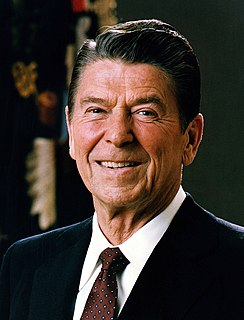
Bill Clinton's tenure as the 42nd president of the United States began with his first inauguration on January 20, 1993, and ended on January 20, 2001. Clinton, a Democrat from Arkansas, took office following a decisive victory over Republican incumbent president George H. W. Bush and independent businessman Ross Perot in the 1992 presidential election. Four years later, in the 1996 presidential election, he defeated Republican nominee Bob Dole and Reform Party businessman Ross Perot to win re-election. Clinton was succeeded by Republican George W. Bush, who won the 2000 presidential election.
The Canada–United States Free Trade Agreement (CUSFTA), official name as the Free Trade Agreement between Canada and the United States of America, was a bilateral trade agreement reached by negotiators for Canada and the United States on October 4, 1987, and signed by the leaders of both countries on January 2, 1988. The agreement phased out a wide range of trade restrictions in stages over a ten-year period, and resulted in a substantial increase in cross-border trade as an improvement to the last replaced trade deal. With the addition of Mexico in 1994, FTA was superseded by the North American Free Trade Agreement (NAFTA).

Ronald Reagan's tenure as the 40th president of the United States lasted from his first inauguration on January 20, 1981, until January 20, 1989. Reagan, a Republican from California, took office following a landslide victory over Democratic incumbent President Jimmy Carter in the 1980 presidential election. Four years later, in the 1984 election, he defeated Democrat Walter Mondale to win re-election in a larger landslide. Reagan was succeeded by his vice president, George H. W. Bush, who won the 1988 presidential election with Reagan's support. Reagan's 1980 election resulted from a dramatic conservative shift to the right in American politics, including a loss of confidence in liberal, New Deal, and Great Society programs and priorities that had dominated the national agenda since the 1930s.
A balanced budget amendment is a constitutional rule requiring that a state cannot spend more than its income. It requires a balance between the projected receipts and expenditures of the government.

The United States International Trade Commission is an agency of the United States federal government that advises the legislative and executive branches on matters of trade. It is an independent, bipartisan entity that analyzes trade issues such as tariffs and competitiveness and publishes reports. As a quasi-judicial entity, the USITC investigates the impact of imports on U.S. industries, and directs actions against unfair trade practices, such as subsidies, dumping, intellectual property infringements and, copyright infringement.
Budget reconciliation is a special parliamentary procedure of the United States Congress set up to expedite the passage of certain budgetary legislation in the United States Senate. The procedure overrides the filibuster rules in the Senate, which may otherwise require a 60-vote supermajority for the passage by the Senate. Bills described as reconciliation bills can pass the Senate by a simple majority of 51 votes or 50 votes plus the Vice President as the tie-breaker. The reconciliation procedure also applies to the House of Representatives, but it has minor significance there, as the House does not have a supermajority requirement. Budget reconciliation bills can deal with spending, revenue, and the federal debt limit, and the Senate can pass one bill per year affecting each subject. Congress can thus pass a maximum of three reconciliation bills per year, though in practice it has often passed a single reconciliation bill affecting both spending and revenue. Policy changes that are extraneous to the budget are limited by the "Byrd Rule", which also prohibits reconciliation bills from increasing the federal deficit after a ten-year period or making changes to Social Security.

The Omnibus Budget Reconciliation Act of 1993 was a federal law that was enacted by the 103rd United States Congress and signed into law by President Bill Clinton. It has also been unofficially referred to as the Deficit Reduction Act of 1993. Part XIII of the law is also called the Revenue Reconciliation Act of 1993.
The economic policies of Bill Clinton, referred to by some as Clintonomics, encapsulates the economic policies of United States President Bill Clinton that were implemented during his presidency, which lasted from January 1993 to January 2001.
PAYGO is the practice in the United States of financing expenditures with funds that are currently available rather than borrowed.

The trade policy of Japan relates to Japan's approach to import and export with other countries.
The Harmonized Tariff Schedule of the United States (HTSUS), also referred to as the Harmonized Tariff Schedule of the United States Annotated (HTSA), is the primary resource for determining tariff classifications for goods imported into the United States. It can also be used in place of Schedule B for classifying goods exported from the United States to foreign countries. The Harmonized Tariff Schedule classifies a good based on its name, use, and/or the material used in its construction and assigns it a ten-digit classification code number, and there are over 17,000 unique classification code numbers. Although the U.S. International Trade Commission publishes and maintains the Schedule in its various forms, U.S. Customs and Border Protection is the only agency that can provide legally binding advice or rulings on classification of imports.
Fiscal conservatism is a political and economic philosophy regarding fiscal policy and fiscal responsibility advocating low taxes, reduced government spending and minimal government debt. Deregulation, free trade, privatization and tax cuts are its defining qualities. Fiscal conservatism follows the same philosophical outlook of classical liberalism.

The Trade Act of 1974 was passed to help industry in the United States become more competitive or phase workers into other industries or occupations.
The fast track authority for brokering trade agreements is the authority of the President of the United States to negotiate international agreements in an expedited manner and with limited congressional oversight. Renamed the trade promotion authority (TPA) in 2002, the TPA is an impermanent power granted by Congress to the President. It remained in effect from 1975 to 1994, pursuant to the Trade Act of 1974 and from 2002 to 2007 pursuant to the Trade Act of 2002. Although it technically expired in July 2007, it remained in effect for agreements that were already under negotiation until their passage in 2011. In June 2015, a third renewal passed Congress and was signed into law by President Barack Obama.
The Exon–Florio Amendment50 U.S.C. app 2170 is a law that was enacted by the United States Congress in 1988 to review foreign investment within the United States. The amendment was passed into law under the Omnibus Trade and Competitiveness Act of 1988 and amended Section 721 of Defense Production Act of 1950. All foreign investments that might affect national security may be reviewed and if deemed to pose a threat to security, the President of the United States may block the investment. According to the amendment, the president may block the investment when "there is credible evidence that leads the President to believe that the foreign interest exercising control might take action that threatens to impair the national security." President Reagan delegated the review process to the Committee on Foreign Investment in the United States.
Ronald Reagan was the 40th President of the United States (1981–1989). A Republican and former actor and governor of California, he energized the conservative movement in the United States from 1964. His basic foreign policy was to equal and surpass the Soviet Union in military strength, and put it on the road to what he called "the ash heap of history". By 1985, he began to co-operate closely with Soviet leader Mikhail Gorbachev–they even became friends–and negotiated large-scale disarmament projects. The Cold War was fading away and suddenly ended as Soviets lost control of Eastern Europe almost overnight in October 1989, nine months after Reagan was replaced in the White House by his vice president George H. W. Bush, who was following Reagan's policies. The Soviet Union itself was dissolved in December 1991. In terms of the Reagan doctrine, he promoted military, financial, and diplomatic support for anti-Communist insurgencies in Afghanistan, Nicaragua, and numerous other countries. For the most part, local communist power collapsed when the Soviet Union collapsed.

Caribbean Basin Economic Recovery Act of 1983 (CBERA) — P.L. 98-67, Title II, authorized unilateral preferential trade and tax benefits for eligible Caribbean countries, including duty-free treatment of eligible products.
The Trade and Tariff Act of 1984 clarified the conditions under which unfair trade cases under Section 301 of the Trade Act of 1974 can be pursued. It also provided bilateral trade negotiating authority for the U.S.-Israel Free Trade Agreement and the U.S.-Canada Free Trade Agreement, and set out procedures to be followed for congressional approval of future bilateral trade agreements.

Foreign trade of the United States comprises the international imports and exports of the United States. The country is among the top three global importers and exporters.

The Reagan Era or Age of Reagan is a periodization of recent American history used by historians and political observers to emphasize that the conservative "Reagan Revolution" led by President Ronald Reagan in domestic and foreign policy had a lasting impact. It overlaps with what political scientists call the Sixth Party System. Definitions of the Reagan Era universally include the 1980s, while more extensive definitions may also include the late 1970s, the 1990s, the 2000s, the 2010s, and even the 2020s. In his 2008 book, The Age of Reagan: A History, 1974–2008, historian and journalist Sean Wilentz argues that Reagan dominated this stretch of American history in the same way that Franklin D. Roosevelt and his New Deal legacy dominated the four decades that preceded it.







